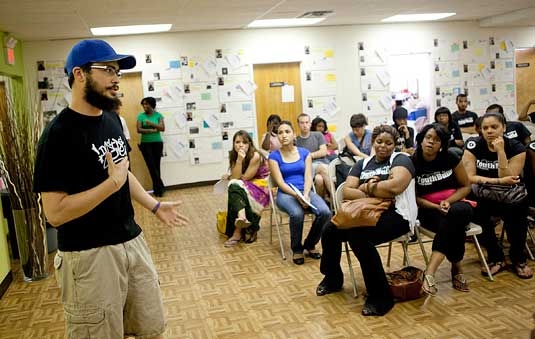Commitment to peace leads Cuddy to exploration of urban violence
Max Cuddy’s four years at Temple, along with his plans for the future, are unified under a common theme: a commitment to peace and dialogue.
Cuddy’s philosophy is a reaction to the story of his great grandmother, who was the only member of her family to survive the Armenian genocide of 1915. “We think her brothers were killed,” he said. “We could rarely get her to discuss it.”
As a result, Cuddy has made it his goal to connect communities that look at each other across a divide. That commitment has been exemplified at every point in his Temple career.
It starts with the Rochester, N.Y. native’s choice to double major in African American studies and sociology. “I have always been interested in race as a concept and in the notion of racial equality,” said Cuddy.
“As a white male from a middle class background, I just felt I needed to formally study inequality and injustice, and I knew Temple had a groundbreaking program in African American studies,” he said. Studying sociology was a natural complement.
As a sophomore Cuddy enrolled in Temple’s Inside-Out Prison Exchange Program, which brings college students and Inside students — prisoners — together inside a corrections facility to study issues of social justice.
The class made a huge impression on Cuddy. “Bringing together two different groups with misconceptions of each other was really eye opening. I began to see interpersonal exchanges I would have never imagined possible,” he said.
Cuddy also found that the course permanently altered his notion of what an education could be. He drew on that experience as a model and jumping off point for another course — one he developed as part of his work with the Temple University Student Peace Alliance, for which he served as vice president.
The group lobbied for a course at Temple that would bring together college students with local high school students to investigate urban violence. Cuddy wrote the proposal for the special topics sociology course that “would be an in-depth analysis of why violence happens on both a macro and micro level and how to prevent violence on large and small scales.”
And by exposing the high school students to college, college work and college students, Cuddy thought it might help them realize college as a feasible option in their futures.
By many measures, the course was a success. “From the first day, the discussions were dynamic and were often led by the high school students,” said Cuddy.
“This class never would have gotten off the ground without Max’s persistence,” said Mary Stricker, associate professor of sociology at Temple and the course’s instructor. “He believed strongly in the need for more connections between Temple students and the people who live and go to school in the surrounding neighborhoods. Those connections were made, and are continuing to grow, simply because Max wouldn’t take ‘no’ for an answer.”
As the recipient of a 2011 Fulbright Scholarship to South Africa, Cuddy’s interest in breaking down barriers and promoting peace will continue. It will be his first trip to Africa, and he hopes to draw on the knowledge of that continent he gained as part of his studies in his major. In addition to teaching courses in English as part of the fellowship, Cuddy intends to organize afterschool programs for youth and work with local NGOs involved in community organizing and development.
And when he returns to the states, Cuddy already knows what’s next. He will spend two years teaching youth in low-income communities as part of Teach for America. A perfect fit indeed.
